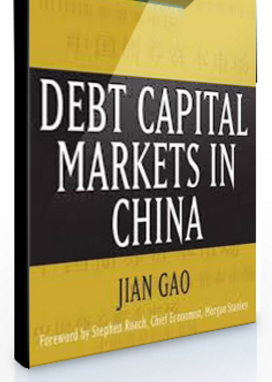Vip-Area
Jian Gao – Debt Capital Markets in China

Jian Gao – Debt Capital Markets in China
Price: $25
Please contact us: – Email: Tradersoffer@gmail -Skype: [email protected]
Visit checkout link: https://tradersoffer.forex/product/debt-capital-markets-in-china-by-jian-gao/
Description
An in-depth look at China’s burgeoning capital markets Author Jian Gao is the number one authority on fixed income markets in China, and with this book, he brings his considerable experience and knowledge about these markets to investors worldwide. For those interested in becoming active in China’s growing fixed income markets, Debt Capital Markets in China is the book you need to get started. It includes coverage of the primary and secondary markets, government debt instruments, corporate bonds, the collateralized bond market, and asset-backed securitizations. Debt Capital Markets in China also examines the developing market trends, which affect investors and institutions looking to make the most of this incredible financial opportunity. Dr. Jian Gao, PhD (Beijing, China) is the Vice Governor of China Development Bank (CDB).
Table of Contents
Foreword. Preface. Acknowledgements. Introduction.
PART ONE: Bond Market: Theory and Practice.
Chapter 1. Theory of Institutional Economic Engineering in China.
Chapter 2. The Practice.
PART TWO: The Emergence of a Primary Market.
Chapter 3. Primary Market for Treasury Bond Transactions.
Chapter 4. Issuing Methods and Practices around the World.
Chapter 5. Path to a Cost-Efficient Treasury Bond Market.
Chapter 6. Evaluation of Treasury Bond Issuance in China.
PART THREE: Emergence of a Secondary Market.
Chapter 7. History of China’s Secondary Bond Market.
Chapter 8. Secondary Market: Operational Issues and Role of Participants and Financial Intermediaries.
Chapter 9. Treasury Bond Investment Fund.
Chapter 10. Treasury Bond Repurchase Market.
PART FOUR: Policy Issues.
Chapter 11. Treasury Bond Market and Open Market Operations.
Chapter 12. Government Debt Policy and Macroeconomics.
Chapter 13. Government Policy on Debt Instruments and Term Structure.
Chapter 14. Impact of Government Policy on Term Structure of Interest Rates.
Chapter 15. Types of Bonds.
Chapter 16. Government Policy on the Holding Structure of Treasury Bonds.
PART FIVE: Organization and Legal Structure.
Chapter 17. Organizational Structure and Institutional Arrangement of the Treasury Bond Market.
Chapter 18. Legal Framework of the Capital Debt Market (Part One).
Chapter 19. Legal Framework of the Capital Debt Market (Part Two).
Chapter 20. Regulation and Deregulation Related to Bond Market Risk Management.
PART SIX: The International Market.
Chapter 21. Foreign Debt Issuance.
PART SEVEN: The Non-Government Securities Market.
Chapter 22. Structure of the Non-Government Bond Market.
Chapter 23. Financial Debentures and the China Development Bank’s Financial Innovation.
Chapter 24. Development of China’s Corporate Bond Market.
Chapter 25. Asset Securitization of the China Development :Bank.
PART EIGHT: The Debt Capital Market.
Chapter 26. Debt Capital Market and the Macroeconomy.
Chapter 27. Size of Government Debt.
Chapter 28. Debt Capital Market as a Stage of Financial Revolution.
Chapter 29. Development of the Chinese Government Bond Market. Postscript. Appendix A. Laws and Regulations Governing Financial Debentures the Federal Reserve of New York on August 3, 2004. Endnotes. Index.
Author Information
Dr. Jian Gao is the Vice Governor of China Development Bank (CDB). Before moving to CDB, he worked in different Departments of the Ministry of Finance for sixteen years. Throughout his career, Dr. Jian Gao has made many outstanding contributions to the formation of China’s Treasury bond market and has led a transition of CDB’s issuing format from administrative placement to market-oriented selling. Over the years, he has introduced new instruments in the market and initiated a series of financial innovations to boost its liquidity. He attended Beijing University of Political Science & Law for graduate studies, received his PhD in economics at the Institute of Public Finance, and was a Post-Doctoral Fellow at Harvard University.

